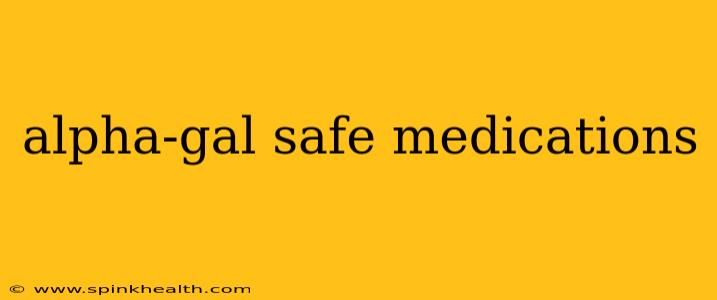The discovery of an alpha-gal allergy can feel like navigating a minefield. Suddenly, many common medications become potential triggers, leaving you wondering: what's safe and what's not? This isn't just about avoiding allergic reactions; it's about managing your health effectively while staying safe. Let's embark on this journey together to understand alpha-gal-safe medication options and the considerations involved.
My name is Dr. Evelyn Reed, and I've spent years working with patients dealing with alpha-gal syndrome. This post isn't medical advice; instead, it's a guide to help you navigate conversations with your doctor and become a more informed advocate for your health.
What are Alpha-Gal Allergies?
Before we delve into safe medications, let's quickly recap. Alpha-gal syndrome (AGS) is an allergy to alpha-gal, a sugar molecule found in the meat of mammals (beef, pork, lamb, etc.) and certain tick bites. This allergy causes a delayed reaction, often appearing hours after exposure. Symptoms can range from mild hives to severe anaphylaxis. But the impact extends beyond food; some medications are derived from mammalian sources and contain alpha-gal or similar components.
What Medications Might Contain Alpha-Gal?
This is where the complexity begins. Many medications aren't explicitly labeled as containing alpha-gal, making identification challenging. However, some common culprits include medications derived from animal sources like:
- Certain insulin types: Some insulins are derived from animal sources and might contain alpha-gal. Always check with your doctor to find an alternative if you have AGS.
- Heparin: This anticoagulant is derived from pig intestines and is a known alpha-gal risk.
- Gelatin capsules: Many medications use gelatin capsules, which are produced from animal collagen.
- Some vaccines: Certain vaccines may contain trace amounts of animal products. It's crucial to discuss your allergy with your doctor before any vaccination.
It's crucial to remember: This list isn't exhaustive. The presence of alpha-gal or related components can vary depending on the manufacturer and production process.
How Can I Find Alpha-Gal-Safe Medications?
This is the million-dollar question, and unfortunately, there's no single, simple answer. Your best approach involves a proactive partnership with your doctor and pharmacist:
- Open communication is key: Inform your doctor and pharmacist about your alpha-gal allergy. Provide them with comprehensive details, including the severity of your reactions.
- Check medication labels carefully: Look for ingredients derived from animal sources. While not always explicit, this can offer clues.
- Investigate alternatives: Ask your doctor about synthetic or plant-derived alternatives. Many medications have non-animal-based versions available.
- Consult medication databases: Some databases offer information about medication composition and potential allergens, though this is not always comprehensive for alpha-gal specifically.
H2: What are the risks of taking alpha-gal containing medications?
The risks of taking medications containing alpha-gal depend on the severity of your allergy and the amount of alpha-gal in the medication. Mild reactions might involve hives or itching, while more severe reactions could trigger anaphylaxis, requiring immediate medical attention. Always inform your medical team of any reaction, no matter how minor it seems.
H2: Can I take over-the-counter medications if I have alpha-gal?
Many over-the-counter medications are safe, but it's still essential to check the ingredients list carefully. Look for medications that are explicitly labeled as being plant-derived or synthetic. When in doubt, consult your pharmacist or doctor.
H2: Are there any specific brands of medications that are known to be alpha-gal safe?
There's no definitive list of "alpha-gal-safe" brands. The safety depends on the specific ingredients and manufacturing processes, which can change. Always check the label and confirm with your doctor or pharmacist.
H2: What should I do if I accidentally take a medication with alpha-gal?
If you accidentally ingest a medication containing alpha-gal, monitor yourself closely for any symptoms. Mild reactions might require antihistamines; severe reactions will necessitate immediate medical attention (call emergency services).
Navigating alpha-gal allergies requires vigilance and proactive communication with your healthcare team. By being informed and actively involved in your treatment plan, you can successfully manage your health and maintain a good quality of life. Remember, your doctor and pharmacist are your allies in this journey. Don't hesitate to ask questions and seek clarification.

